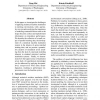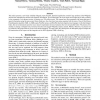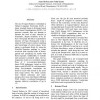55 search results - page 5 / 11 » Knowledge Lean Word-Sense Disambiguation |
118
click to vote
COLING
2010
14 years 8 months ago
2010
In this paper we investigate the challenges of applying statistical machine translation to meeting conversations, with a particular view towards analyzing the importance of modeli...
130
click to vote
BMCBI
2010
15 years 1 months ago
2010
Background: Word sense disambiguation (WSD) algorithms attempt to select the proper sense of ambiguous terms in text. Resources like the UMLS provide a reference thesaurus to be u...
120
click to vote
COLING
1992
15 years 2 months ago
1992
This paper describes a program that disambignates English word senses in unrestricted text using statistical models of the major Roget's Thesaurus categories. Roget's ca...
102
click to vote
LREC
2010
15 years 3 months ago
2010
This article presents a new freely available trilingual corpus (Catalan, Spanish, English) that contains large portions of the Wikipedia and has been automatically enriched with l...
COLING
2008
15 years 3 months ago
2008
The use of topical features is abundant in Natural Language Processing (NLP), a major example being in dictionary-based Word Sense Disambiguation (WSD). Yet previous research does...



